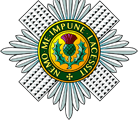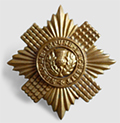The next time the Scots Guards were on operations was in 1882. Egypt, though self governing under the Khedive, was on a tight British rein, the main concern, then and later, being the Suez Canal. Arabi Pasha, the Khedive’s war minister, raised a nationalist rebellion against the Khedive’s government and there were British counter measures, it becoming apparent soon that more troops would be needed than were available in the Eastern Mediterranean. The 1st Battalion was in the Guards Brigade which sailed in July and arrived at Alexandria two weeks later. Lieutenant General Sir Garnet Wolseley’s march from the sea towards Cairo was completely successful, attempts by Arabi Pasha’s army to disrupt it being easily beaten off. At dawn on 13 September after an approach over open sand during the dark, the British overran Arabi Pasha’s defensive position and crushed his army. There were two more Battle Honours for the Scots Guards, “TEL EL KEBIR” and “EGYPT, 1882”. The Guards Brigade went home. Soon afterwards in 1883 there was another less formally constituted but far more dangerous and persistent rebellion in Sudan led by a man who proclaimed himself Mahdi and quickly had a large following of fanatics. Initial attempts to deal with this by the British led Egyptian Army failed heavily. While the British Government were reluctant to become involved, once Major General Charles Gordon was sent to Khartoum and then trapped and killed, public opinion demanded revenge. General Wolseley led the relief expedition up the Nile, which included a Guards Camel Regiment drawn from all three Regiments of the Foot Guards. There were also two expeditions against the Mahdi mounted from the northeast coast of Sudan in 1814 and 1885. The 2nd Battalion was in a Guards Brigade in the second of these, the first time that the Scots Guards wore khaki. There was some fighting in unforgiving country of prickly scrub and usually dry watercourses, perfect cover for a guerrilla type enemy indifferent to casualties. The Scots Guards were awarded the Battle Honour “SUAKIN”. It became hotter and hotter until General Wolseley arrived in May with the news that the British Government had decided to evacuate Sudan and the Guards Brigade went briefly to Cyprus. The reason for both was that there was another row with Russia, this time over the Afghanistan border and tension briefly ran high.
The website of the Scots Guards Regimental Family – Scotland’s Own Regiment of Foot Guards


